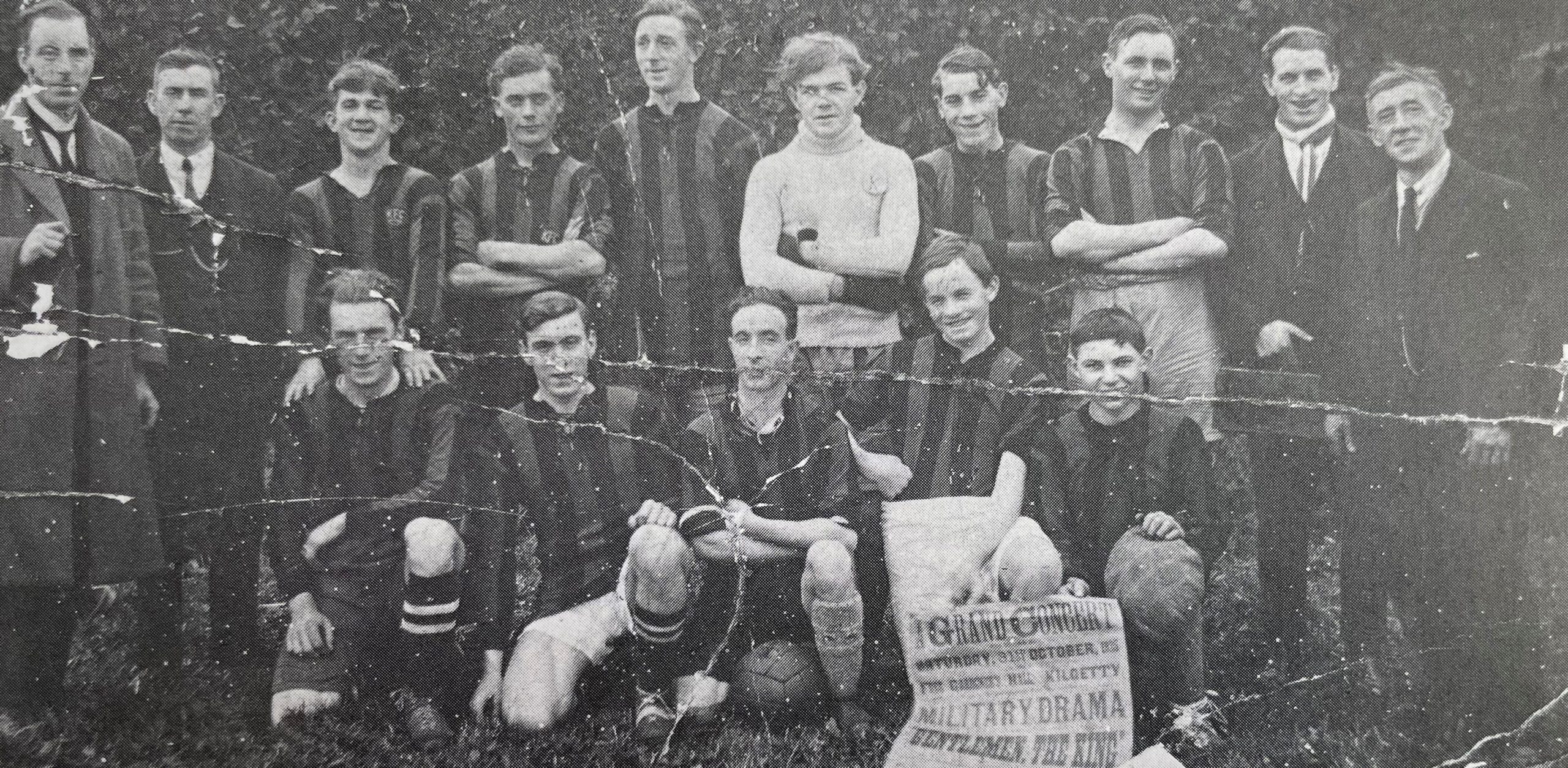Kilgetty AFC 1925
From left to right: Mr Sabin; Harry Badham; Fred Thomas; Willie Rees; I. Kennedy; Bob Phelps; Oliver Phelps; W. Palmer; Jack John; Roger Griffiths.
Front row: Cliff Thomas; Bill Prout; Len Hunt; Dick Morgan; Aneurin Lloyd.
Established 1924

Kilgetty AFC was formed by a small group of men from the village who had originally taken to playing Rugby shortly after the end of the 1st World War on Kilvelgy Field.
For reasons unknown, this group of men turned their back on the oval ball and formed the village football club in 1924. What we know of the original founding members, Harry Badham was the first Chairman of the club, Wilfred Thomas was the Treasurer, Dr Pennant was the President and Commander Dick Morgans became the Club Secretary.
E.G. ‘Ted’ Edwards who ran the greengrocers at Bridge Stores was one of the early players who later went on to be Chairman at Kilgetty and even more impressively, Chairman of the Football Association of Wales.
From its humble beginnings, the club grew to become a force to be reckoned with in Pembrokeshire. The team, electing to play in blue and white stripes, first won the Pembrokeshire Cup in 1939.
There was little football played throughout the Second World War, but by 1946 the club had now moved its weekly committee meetings to the Free Gardeners Hall where playing tactics would be often debated into the night. Not the most salubrious of venues, but a significant step forward from their pre-war meetings in the loft above Mr Edwards Shop.
At this time, in the latter part of the 1940s, just like today, the players were expected to pay a membership fee to play. In 1946 senior members were charged a shilling, whilst junior members were expected to pay sixpence for the privilege of belonging to a Pembrokeshire league club.
The players from the 1940s included John ‘Razor’ Griffiths, Wyndham Thomas, Raymond ‘Wetter’ Badham (son of Harry), and goalkeeper Don Cole. In a press article in 1993 Don recalled his playing days with affection, “I played for Kilgetty for eight years until 1953. We had no facilities and changed out the back of the Kilgetty Arms pub, with a tub of cold water to clean up. We had to make sure we were smart because we would be going to the De Valence in Tenby after the match, looking for romance.”
In the 1950s Kilgetty Football Club was one of the first clubs to sign a foreign player. Johnny ‘the Pole’ Matuszweski, was a Polish prisoner of war who had been held as a prisoner in the camp at Ryelands Lane on the outskirts of the village. Settling in Kilgetty after the war he immediately signed for the club and in doing so he introduced a style of football previously unseen in Pembrokeshire. At the time he was regarded as the best player in the county.
Throughout the 50s and 60s Kilgetty experienced continued success. Dai Howells, Tom Ellis & Billy Prout were prominent players for the club and in 1956 they won the second division cup. Dai, Tom & Billy would continue to be involved with the club for over 60 years and were instrumental in the move to the Kingsmoor Sports Ground.
Times weren’t always so successful, and by 1971 Kilgetty were playing in the third tier of Pembrokeshire football. At this time, local school teacher Des Stone took over the running of the team, reinstalling a new discipline and a new belief that the players could achieve much more than their present standing suggested. In just two seasons Des took the team through two promotions and back to the first division.
In 1976 John Crosby, a former professional goalkeeper, took over the running of the team having moved into the village as landlord of the Stepaside Inn following his retirement from the professional game. John built upon the solid foundations laid down by Des Stone, guiding the team to 3 successive Pembrokeshire cup finals in 1977, 1978 & 1979. Around this time Kilgetty players and brothers, Norman and Maybrow James, were a real force to be reckoned with. Norman ‘Keegan’ James feared throughout the county for his no-nonsense brand of football and Maybrow for his prolific scoring record. Wallace Howells being another naturally gifted goalscoring striker who terrorised many a centre-half across the pitches of Pembrokeshire.
In 1990 the club moved to its current home at the Kingsmoor Sports Ground, a newly built sports facility with dressing rooms for the players and officials overlooking two magnificent playing fields. Over the next two decades, some wonderful players graced the fields of Kingsmoor. The likes of Ronnie & Allen Hurst, Bobby Bevan, Paul Hancock, Steve ‘Smudger’ Smith, Lee ‘Curly’ Watts, Dai Griffiths, Barry Lewis, Paul Mansbridge, Huw Lewis, Rory Howells, Ollie Griffiths and many more.
Managed in the early 90s by Kelly Rossiter, they won the 2nd Division Cup in 91 and 92, and reached the final again in 93. 11 years later, under a new management team of Wallace Howells and Allen Hurst, Kilgetty were promoted to the 1st division as champions of the 2nd division having completed the season without losing a game.
Then in 2008, manager Andrew Cope assisted by Bobby Bevan completed a double trophy winning season by beating Saundersfoot 4-0 in the 2nd Division Cup and running out as division champions a week later.
Kilgetty Football Club has a distinguished record of producing some of our county’s most prolific players. None more so than the late George Edwards, son of ‘Ted’ the former Chairman. George was scouted by Swansea Town in the 1930s whilst studying at Swansea University, and went on to play for Coventry City, Birmingham City and Cardiff City, earning himself 17 caps for Wales and famously scoring the winning goal against England at Ninian Park. A fantastic ambassador for his village team, during his time at Birmingham City he would often travel back to get a game for Kilgetty whenever City didn’t have a fixture, something that would be unheard of in the modern game.
George was not alone in his progress from the pitches at Kilvelgy and Kingsmoor. Derek Harris had a spell with Wolverhampton Wanderers. Graham Jenkins was capped for Wales in the same team as John Toshack. Neil Proctor was the first Pembrokeshire player to represent his country at junior level and Robert ‘Boxer’ Beynon, the current 1st team manager, represented Wales schoolboys on several occasions, including a match against England which featured a young Michael Owen. Dean ‘Deano’ Rossiter had a distinguished playing career in the Welsh Premier League for 13 years, with both Haverfordwest County and Carmarthen Town, playing on two occasions in the UEFA Cup. Grant James, son of Norman, played for Swansea City youth team winning 3 trophies, earning himself a call up to the 1st team at the Vetch Field.
Over the last 10 years several junior players have come through the Kilgetty youh system and gone on to represent Haverfordwest County and Swansea City. Most prominent of which is Liam Cullen, who joined Swansea City at the age of 9 and has now been a professional with the club for the last 4 years, currently playing for Swansea in the EFL Champinship. Liam has also represented Wales at Under 17, Under 19, Under 20 and Under 21 level, and was recently called up to the Welsh senior squad for the European Championship Qualifying games against Croatia and Latvia on 25th & 28th March 2023.
